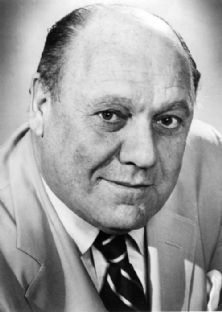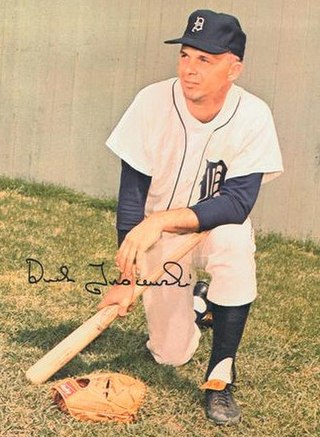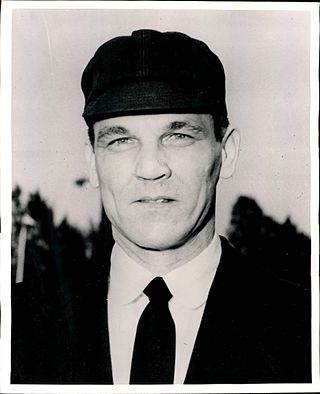
Sanford Koufax, nicknamed "the Left Arm of God", is an American former baseball pitcher who played 12 seasons in Major League Baseball (MLB) for the Brooklyn/Los Angeles Dodgers from 1955 to 1966. Widely regarded as one of the greatest pitchers in baseball history, Koufax was the first three-time winner of the Cy Young Award, each time winning unanimously and the only pitcher to do so when a single award was given for both the leagues; he was also named the National League Most Valuable Player in 1963. Retiring at the age of 30 due to chronic pain in his pitching elbow, Koufax was elected to the Baseball Hall of Fame in his first year of eligibility in 1972 at the age of 36, the youngest player ever elected.

Maurice Morning Wills was an American professional baseball player and manager. He played in Major League Baseball as a shortstop from 1959 to 1972, most prominently as an integral member of the Los Angeles Dodgers teams that won three World Series titles between 1959 and 1965. He also played for the Pittsburgh Pirates and the Montreal Expos. Wills is credited with reviving the stolen base as part of baseball strategy.

John Junior Roseboro was an American professional baseball player and coach. He played as a catcher in Major League Baseball from 1957 until 1970, most prominently as a member of the Los Angeles Dodgers. A four-time All-Star player, Roseboro is considered one of the best defensive catchers of the 1960s, winning two Gold Glove Awards. He was the Dodgers' starting catcher in four World Series with the Dodgers winning three of those.
The 1966 World Series was the championship series of Major League Baseball's (MLB) 1966 season. The 63rd edition of the World Series, it was a best-of-seven playoff between the American League (AL) champion Baltimore Orioles and National League (NL) champion Los Angeles Dodgers. The Orioles swept the series in four games to capture their first championship in franchise history. It was the last World Series played before MLB introduced the Commissioner's Trophy the following year. The Dodgers suffered record low scoring, accumulating just two runs over the course of the series, the lowest number of runs ever scored by any team in a World Series.
The 1965 World Series was the championship series of Major League Baseball's (MLB) 1965 season. The 62nd edition of the World Series, it was a best-of-seven playoff that matched the National League champion Los Angeles Dodgers against the American League champion Minnesota Twins. The Dodgers won in seven games.

James William "Junior" Gilliam was an American second baseman, third baseman, and coach in Negro league and Major League Baseball who spent his entire major league career with the Brooklyn / Los Angeles Dodgers. He was named the 1953 National League Rookie of the Year, and was a key member of ten National League championship teams from 1953 to 1978. As the Dodgers' leadoff hitter for most of the 1950s, he scored over 100 runs in each of his first four seasons and led the National League in triples in 1953 and walks in 1959. Upon retirement, he became one of the first African-American coaches in the major leagues.

Emil Joseph "Buzzie" Bavasi was an American executive in Major League Baseball who played a major role in the operation of three California baseball franchises from the late 1940s through the mid-1980s, most notably as the general manager of the Los Angeles Dodgers from 1958 to 1968.

Louis Brown Johnson, nicknamed "Sweet Lou", was an American Major League Baseball outfielder. Johnson's professional baseball career lasted for 17 seasons, and included 8 years in the majors: parts of 1960–1962 and 1965, and then the full seasons of 1966 through 1969. He threw and batted right-handed and was listed as 5 feet 11 inches (1.80 m) tall and 170 pounds (77 kg).
This is a list of award winners and league leaders for the Los Angeles Dodgers professional baseball franchise, including its years in Brooklyn (1883–1957).

Richard Joseph Tracewski, nicknamed "Trixie", is an American former baseball player, coach, and manager. During his playing career, he was an infielder for the Los Angeles Dodgers and Detroit Tigers of Major League Baseball, appearing in 614 games over eight seasons, from 1962 to 1969.

Herman Thomas Davis Jr. was an American professional baseball player and coach. He played in Major League Baseball as a left fielder and third baseman from 1959 to 1976 for ten different teams, most prominently for the Los Angeles Dodgers where he was a two-time National League batting champion and was a member of the 1963 World Series winning team.

On September 9, 1965, Sandy Koufax of the Los Angeles Dodgers pitched a perfect game in the National League against the Chicago Cubs at Dodger Stadium.

Henry Charles "Shag" Crawford was an American professional umpire in Major League Baseball who worked in the National League from 1956 to 1975. During his twenty seasons in the National League, Crawford worked more than 3,100 games and as a home plate umpire was notable for getting in a low crouch and resting his hands on the back of the catcher in front of him. Crawford wore number 2 after the National League adopted numbers for its umpires, which was then transferred to his son Jerry Crawford, who wore it from 1976 until his 2010 retirement.
Michael Leahy is an American author and award-winning writer for The Washington Post and The Washington Post Magazine. He is best known for his latest non-fiction book The Last Innocents, which examines the tumultuous political and social change of the 1960s through the lens of the era's legendary Los Angeles Dodgers.
The 1967 Los Angeles Dodgers season marked the end of one of the franchise's most successful eras. One season after losing the World Series to the Baltimore Orioles, the Dodgers declined to a record of 73–89, and finished ahead of only the Houston Astros and the New York Mets in the National League race, 28+1⁄2 games behind the NL and World Series Champion St. Louis Cardinals. It was the Dodgers' worst record since the war-affected 1944 season, and their worst peacetime record since 1937. The Dodgers would not return to the postseason until 1974.
The 1966 Los Angeles Dodgers won the National League championship with a 95–67 record, but were swept by the Baltimore Orioles in the World Series.
The 1965 Los Angeles Dodgers finished the regular-season with a 97–65 record, which earned them the NL pennant by two games over their arch-rivals, the San Francisco Giants. The Dodgers went on to win the World Series in seven games over the Minnesota Twins.
The 1962 Los Angeles Dodgers season was the fifth for the team in Southern California, and the 73rd for the franchise in the National League. After spending the previous four seasons at the Los Angeles Memorial Coliseum, they began the season by opening Dodger Stadium, the team's new ballpark. The stadium opened on April 10 with a game against the Cincinnati Reds. The Dodgers proceeded to win a Los Angeles record 102 games and tied the San Francisco Giants for first place in the National League. The Giants won the ensuing tie-breaker series two games to one.
The 1962 National League tie-breaker series was a best-of-three playoff series that extended Major League Baseball's (MLB) 1962 regular season to determine the winner of the National League (NL) pennant. The games were played from October 1 to 3, 1962, between the Los Angeles Dodgers and the San Francisco Giants. The Giants won the series, two games to one. The first game took place at Candlestick Park and the second and third were played at Dodger Stadium. The tie-breaker series was necessary after both teams finished the season with identical win–loss records of 101–61. The Dodgers won a coin flip late in the season, which gave them home field advantage. The series was broadcast nationally by NBC television, with Bob Wolff, George Kell, and Joe Garagiola announcing, and NBC Radio, with Al Helfer and George Kell announcing.

The "Battle of Candlestick", also called the "Battle of San Francisco" or simply the "Marichal-Roseboro brawl", was an infamous bench-clearing brawl which took place on August 22, 1965, at Candlestick Park in San Francisco, California, United States. In what is considered to be one of the most violent on-field brawls in sports history, pitcher Juan Marichal of the San Francisco Giants hit catcher John Roseboro of the Los Angeles Dodgers on the head with a bat, opening a gash on Roseboro's head and starting a fourteen-minute brawl between the teams in the middle of a heated pennant race.









